世纪商务英语听说专业篇I 课件 unit 6
新世纪大学英语视听说Unit 6 PPT及答案学习资料

speeds up decision-making saves time
makes it easier to stay in
touch
Advantages of sending IMs
Disadvantages of sending IMs
speeds up decision-making, saves time, adds stress to the workplace, fosters communication, makes it easier to distracts from regular work. stay in touch.
新世纪大学英语视听说Unit 6 PPT及答案
Lesson A Technostress Lesson B Extreme gadgets
Vocabulary Focus
Information overload
Many people today use IMs (instant messages) to communicate instantly over the Internet. What are some of the advantages and disadvantages of sending IMs?
ቤተ መጻሕፍቲ ባይዱ
Keys
Lesson A Technostress Lesson B Extreme gadgets
Vocabulary Focus
Information overload
Read this letter to an advice columnist. What is Ms. Silva’s problem? Notice the words in blue.
unit 6 接受与确认 世纪商务英语 外贸函电教学课件

business, come to the conclusion, come to terms, reach an agreement 达成 交易/协议 3. as an exception 破例 4. initiate business with sb. 开始与某人的贸易 5. confirm the following order 确认下述订单; confirm an order 确认订单 6. Enclosed please find..., Enclosed you will find... 随函附上……,请查收。 7. initial order 首次试订 8. accept an offer/order/quotation 接受发盘/订单/报价 9. place/book a trial order with sb. 向……试订货 10. as per sample 按照样品
2pical Sentences (1)
1. With reference to the faxes exchanged between us in the last few days, we are pleased to have been able to finalize the following transaction with you.
商务英语听说PPT Unit 6 Price Bargaining
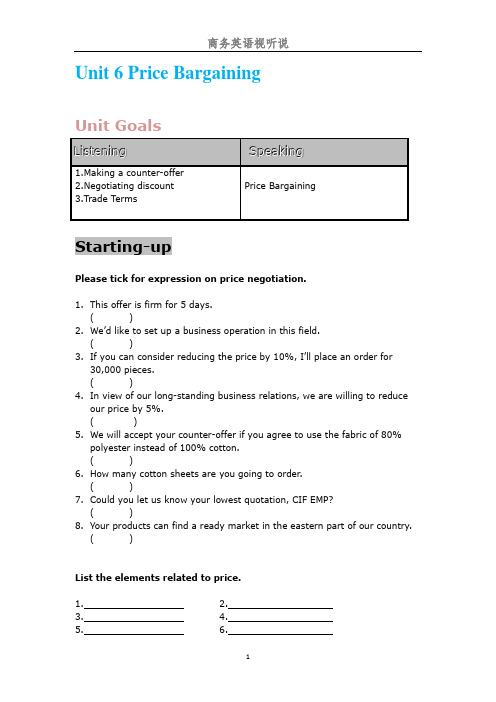
Unit 6 Price BargainingUnit GoalsStarting-upPlease tick for expression on price negotiation.1.This offer is firm for 5 days.( )2.We’d like to set up a business operation in this field.( )3.If you can consider reducing the price by 10%, I’ll place an order for30,000 pieces.( )4.In view of our long-standing business relations, we are willing to reduceour price by 5%.( )5.We will accept your counter-offer if you agree to use the fabric of 80%polyester instead of 100% cotton.( )6.How many cotton sheets are you going to order.( )7.Could you let us know your lowest quotation, CIF EMP?( )8.Your products can find a ready market in the eastern part of our country.( )List the elements related to price.1. 2.3. 4.5. 6.Initial ListeningBefore listening, please learn the following trade terms by heart.T T a a s s k k11You will hear some phrases covering the reduction in price and discount. Repeat for the first time you hear. Then listen again and write your answers down.1._________________2.________________3._________________4.________________5._________________6.________________7._________________ 8.________________9._________________ 10.________________T T a a s s k k22You will hear eight sentences. When you hear the first time, repeat the sentences and pay attention to the stresses and tones. Then listen again and fill in the missing words.1.washing machines is too high to be acceptable.2.We regret to say that your price is .3.We don’t think there is business unlessyou .4.We think the price you offered quite reasonable but haveto .5.The customer agrees to of the total valueof .6.I’ll for the sake of the beautiful colour of your products..7., I think the price is reasonable.8.Your counteroffer is to you.T T a a s s k k33You will hear 5 short conversations. At the end of each conversation, one question will be asked. Both the dialogue and question will be spoken only once. Mark the best answer for each question.1. A. He would like the price to be far beyond.B. He wants the price to be lower.C. He expects to get the quotation from the woman.D. He finds the price acceptable.2. A. She wants to have a little profit.B. She informs the man of the supply position of raw materials.C. She quotes the price for raw materials.D. She explains the reason why the price is high.3. A. He can accept the price on CFR basis.B. He wants the woman to quote CFR.C. He asks the woman whether she can supply the goods.D. He hopes the woman to supply the goods on CFR basis.4. A. She will accept the order over 50,000 pieces.B. She agrees to allow a discount for the orders from the man.C. She can give the man a discount for orders up to the stipulated quantity.D. She intends to place orders for 50,000 pieces.5. A. He doesn’t agree with the woman.B. He can accept to increase the negotiated price by 1%.C. He couldn’t meet each other half way.D. He couldn’t lowe r the price by 1%.Oral DiscussionBefore discussion, you are given the following advices. Professional Advices1. For sellers, how to persuade buyers into accepting the price?Analyze the structure of the costExplain the market price of raw materialsDraw buyers’ attention to the qualitySort out the factors influencing the priceTake advantage of profit marginSet the price limit to be accepted2. For buyers, how to decide the target price?Research the market level for particular productsStudy catalogues and price list from vendorsMaster product informationKnow about production lineAsk sellers for minimum quantityWatch more vendors’ advertising and offersUnderstand the vendor’s costMake reference to retail priceNow, please complete the following tasks.T T a a s s k k11Work in pairs. Discuss what difference there are between counter-offer and price bargain?T T a a s s k k33Work in pairs. List the procedures of business negotiation and design the situation for each step.T T a a s s k k11Discuss the following topic.Imagine you are a seller to persuade your buyer into accepting the price, put down the persuasive sentences.Intensive ListeningLearn the following by heart before listening.D D i i a a l l o o g g u u e e11..1.Listen to the dialogue and decide whether the following statementsare true or false. Write “T” for true and “F” for false.1.Mr. Smith would like the price to be lower 8%. ( )2.Mr. Wang agrees to reduce the price by changing the style of embroidery.( )3.Mr. Smith doesn’t like to change the embroidery. ( )4.Mr. Wang and Mr. Smith meet each half way finally. ( )5.The finally confirmed price USD5.35. ( )2.Listen to the dialogue again and complete sentences according tothe contents in the dialogue.1. I have compared your quotation with those of and I’m sorry tosay that your price is about .2. We consider it indeed.3. To accept the price you quoted would leave us only on oursales because the principle demand in our city is for the similar articles .4. My target price is .5. If we can use five layers of petal instead of eight, the cost will be reducedand the price will also .3.Take notes for negotiation on priceMr. Smith’s target price _______________________Mr. Wang’s second quotationfor original style _______________________Change of Style _______________________The price agreed uponfor the revised style _______________________D D i i a a l l o o g g u u e e22..Listen to the dialogue and choose the best answer to each of the following questions.1.What does Mr. Wang think about the counter-offer from Mr. Smith?A.The price counter offered is too low for him.B.He can comply with the request for the counter-offer.C.The samples which are made for other countries.2.In which respect does Mr. Wang think his price competitive?A.DiscountB. Quantity C Quality3.How much higher than the market level does Mr. Smith find ?A.5%B. 15%C. 10%4.What accommodation is Mr. Wang able to give ?A. A reduction of 15% will be given.B.The price will go down to 5%C.The price will be reduced by 5%5.Does Mr. Smith accept the accommodation?A.No, but he wishes to have a cooperation in furture.B.Yes, he agrees to Mr. Wang’s advice .C.Not mentioned.Oral presentationIn this part, please make oral presentations after reading the following tasks. You are given the functional sentences to help you.Functional Sentences1. Your price is too high to be acceptable.2. Since the prices of the raw materials have been raised, I am afraid that wehave to adjust the prices of our products accordingly.3. Please see to it that your price is out of line with the prevailing market here.4. We are informed that our price is on the high side.5. We have cut our price to the limit, we regret being unable to comply with yourrequest for further reduction.6. We have already cut down our prices to cost level.7. The qualities are satisfactory, but your prices are considerably above ourusual figures.8. Commission transaction will surely help to push the sale of products.9. It’s really impossible for us to make any further concession in your price byallowing you any commission.10. The best we can do is to give you’re a 2% commission.11. On orders exceeding USD10000, we will allow you 5% discount.12. We regret having to decline your request for raising the price.13. We usually don’t grant any discount for small quantities.14. To have this business concluded, you need to lower your price at least by3%.15. We are pleased to grant you a 7% discount from the original offer since youagree to increase the order.16. We accept the price of USD50,000 for 10,000 pairs of leather shoes.17. In view of our good cooperation over the past few years, we are consideringaccepting your price.18. With an eye to future business, we agree to grant you 5% discount as aspecial accommodation.19. We have to say that our price has been reduced to the limit.20. May I put it this way that we meet each other half way to fill the gap in price? T T a a s s k k11Retell the passage of Dialogue 1 with the words and useful sentences used in the dialogue.T T a a s s k k22Work in pairs. Student A plays the role of seller and Student B plays the role of buyer. Make up a dialogue according to the following situation. You sell exercise bicycles on behalf of Tianjin Recreation Equipment Imp. & Exp. Co. A business from Canada wants to buy 500 sets of your bicycles. Your price is USD200 per set FOB Tianjin, but he can offer USD180 per set. You start bargaining.Background InputNegotiation the price of goods is the most important factor in negotiating for merchandise. One thing that must constantly be kept in mind is that the good must be “right”. It is better to overpay for the right goods than to underpay for the wrong merchandise. The buyer’s success in negotiating price may be greatly improved by the knowledge of the market in general and the individual resource in particular.Bargaining is an intensely personal act that must be learned from experience rather than a textbook. However, certain factors are more or less constant. Firstly, both the buyer and the seller approach the bargaining session with “limit” in mind. The buyer knows the maximum he or she is willing to spend and the seller, the minimum he or she will take. In bargaining each party tries to improve on his or her limit. Secondly, it is helpful for the buyer to give reasons for his or her offer. The buyer may build a case by discussing the retail selling price, the risk of consumer demand, the lateness of the season, and so on. Thirdly, usually after the negotiating has been in progress awhile, one of the parties always seems to suggest splitting the difference. That is , if the offer is $2 and the asking price is $4, they should settle at $3. The buyer should keep this in mind all the time, because this unseen price is closer to the final result than either the bid or the offer. Fourthly, it is unquestionably to the buyer’s advantage to maintain a friendly ongoing relationship with resources.。
世纪商务英语外贸函电课件unit 6

我们决定按每台CIF广州3.5美元的价格接受贵方报盘。
LOGO
Part Two
Steps/Contents Typical Expressions
We have accepted your order No.111 for ladies’ clothing and are sending you our sales 3. Stating that you have enclosed an order form, confirmation No.BS-043. 我们已经接受贵方第111号订购女式服装的订单, 并 a contract confirmation, or a sales confirmation or 随函附上我方第BS-043号销售确认书。 Enclosed please find our sales contract No.4567 in asking the receiver to duplicate. prepare them (It is not 随函附上我方销售合同第4567号一式两份,请查收。 necessary the case, however.)
Expressions (1) 1. with the view of sth., with a view to doing sth. 以……为目的, 本着……的宗旨 2. finalize a transaction, put the deal through, close the deal, conclude a business, come to the conclusion, come to terms, reach an agreement 达成 交易/协议 3. as an exception 破例 4. initiate business with sb. 开始与某人的贸易 5. confirm the following order 确认下述订单; confirm an order 确认订单 6. Enclosed please find..., Enclosed you will find... 随函附上……,请查收。 7. initial order 首次试订 8. accept an offer/order/quotation 接受发盘/订单/报价 9. place/book a trial order with sb. 向……试订货 10. as per sample 按照样品
新世纪大学英语视听说Unit6PPT及答案

you lose focus and become less efficient. 2. Spend more time with family, coworkers, and friends: A computer is not a
英语专业视听说book 1 Unit 6
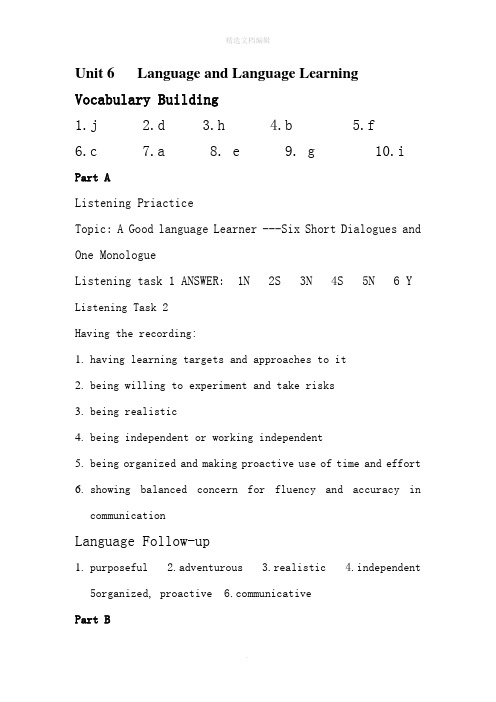
Unit 6 Language and Language Learning Vocabulary Building1.j2.d3.h4.b5.f6.c7.a8. e9. g 10.iPart AListening PriacticeTopic: A Good language Learner ---Six Short Dialogues and One MonologueListening task 1 ANSWER: 1N 2S 3N 4S 5N 6 Y Listening Task 2Having the recording:1.having learning targets and approaches to it2.being willing to experiment and take risks3.being realistic4.being independent or working independent5.being organized and making proactive use of time and effort6.showing balanced concern for fluency and accuracy incommunicationLanguage Follow-up1.purposeful2.adventurous3.realistic4.independent5organized, proactive municativePart BListening PracticeTopic: Learning English in America ---an InterviewListening Task 1Questions asked by the interviewer:1.why did you choose “Stella” as your nickname?2.why did you choose to study journalism in America?3.did you say you had studied English for 10 years?4.Did you find it more difficult to speak English or to writeit?5.Has there ever been an occasion when someone ridiculed yourEnglish?Listening Task 21. C 2 D 3 B 4 D 5 CLanguage Follow-up1.I’ve studied English for about 10 years, so there will beno great language barrier to communication if I choose to study in America.2.I have a lot of friends and relatives here, so I can be takencare of by them.3.English is an international language, so most of learn itwhen we are young.4.it seems in Taiwan we have more of an opportunity for readingand listening5.I have learnt English for 10 years and still can’t expressmyself very clearly.Part CListening practiceThe Story of the Norfolk-Pitcairn Dialect----a Radio Talk Listening task 1This program tells us the origin of Norfolk-Pitcairn language, its development over the years, the problems it faces at present, and measures taken to save the language.Listening task 21 F2 T3 F4 F5 T6 FLanguage follow-up1.to2.of3.under4.on5.to6. with7.in8.ofPART AA Good Language Learner ---Six Short Dialogues and One MonologueLISTENING TASK 11.Man: Do you like going swimming with Mark in the river? Woman: He always swims in the river It's too dirty for me.Question: Does the woman like going swimming with Mark?2. Woman: Do you like listening to pop music?Man: It depends.Question: Does the man like listening to pop music?3. Man: Would you like to watch the football match with me tomorrow afternoon?Woman: Football matches are always awful.Question: Does the woman like watching football?4. Woman: Do you like Chinese food?Man: Not at all .Question: Does the man like eating Chinese food?5. Woman: Would you like an ice cream?Man: Well... I'd rather have something hot instead.Question: Does the man like eating ice cream?6. Man: Let's play computer games, shall we?Woman: Terrific!Question: Does the woman like playing computer games? LISTENING TASK 2There has been a lot of research in recent years into what makes a good language learner. Here is a brief summary of the latest theories:Good language learners think about how they are learning. Theytry to find out what works for them and what doesn't. If; they don't understand the purpose of a particular exercise, they ask their teacher for a clear explanation.Good language learners are willing to experiment and take risks. For example, they will out different ways of learning vocabulary until they find the way that suits them best. They are also not afraid of making mistakes because they know that these will help them.Good language learners are realistic. They know that it will take time and effort to become proficient in English, and that there will be periods when they don't seem to be making much progress.Good language learners are independent. They do not expect to learn English just by sitting in the classroom, and do not rely on the teachers to direct their learning.Good language learners are organized and proactive. They use their time to learn English sensibly, and are always looking for opportunities to develop their language both inside and outside the classroom.Some students are extroverts in communicating their thoughts and do not care about making many mistakes in doing so. Good language learners, on the other hand, are concerned with bothfluency in communication and accuracy of language usage PART BLearning English in America ...... an Interview Interviewer:Hello, Miss Hsiao! From your CV we know that your Chinese name is Wenchin Hsiao, and that you have an interesting English nickname, "Stella". Why did you pick "Stella" as your nickname?Wenchin Itsiao: I wanted to find a unique name, and "Stella" sounds different. I picked it from a dictionary. "Stella" means star.Interviewer: Why did you choose to study journalism in the US? Wenchin Itsiao: I have at least two reasons. One is, the States is an English speaking country. I've studied English for about 10 years, so there will be no great language barrier to communication if I choose to study in America. The second reason is, journalism in the States is more advanced and influential than in any other countries. And there're quite a few world famous universities which offer best courses in journalism. Also, I have a lot of friends and relatives here, so I can be taken care of by them.Wenchin Itsiao: Yes, I started in junior high school . I also learned Japanese when I was at university. Japan occupiedTaiwan of China for 15 years, so a lot of people in Taiwan could speak Japanese. And also, for a Chinese, learning Japanese is easier because Japanese has borrowed a lot of words and characters from Chinese. Learning Japanese is easier than learning English. But English is international language, so most of us learn it when we are young.Interviewer:Do you find it more difficult to speak English or to write it?Wenchin Hsiao: Oh, I have difficulty in writing and speaking, but not in reading and listening. It seems in Taiwan we have more of an opportunity for reading and listening. But I have to improve my English writing and speaking skills in America. Interviewer Has there ever been an occasion when someone ridiculed your English?Wenchin Hsiao: No, but I'm a sensitive person. If I say something and they can't understand me, they'll say, "I'm sorry I can't understand you." If they say that, then I feel frustrated or embarrassed. I have been learning English for 10 years and still can't express myself very clearly.PART CThe Story of Norfolk-Pitcairn Language---- a Radio Talk Bruce Hill: Hello and welcome to Pacific Focus on Today'sSociety. I'm Bruce Hill. Norfolk Island in the Tasman Sea is home to one of the most unique cultures in the Pacific. And one of the things the islanders are most proud of is their unique language. But as with many languages in the region, the Norfolk-Pitcairn dialect is under threat of being diluted or being superseded entirely by mainstream English. So for the first time it's going to be taught in the schools on Norfolk Island. Ellis Buffet has written a grammar book and dictionary of the Norfolk-Pitcairn language to help school children learn the language. She says one of the concerns that the islanders have is that inter-marriage with outsiders might dilute the languageEllis Buffet: A lot of children and young people who are of Norfolk Island blood or Pitcairn descent, who can't speak the Norfolk Island language, have come to me in recent years and asked me where their culture is and where their language is. By 1987, I foresaw that it would happen that the people would be wanting to know how to speak their language. So I have given the language a writing system because English is too hard. You can't use the English might speak a fair bit of English mingled with the language (which is not pronounced the same as English), it was necessary to have a spelling system that could write thelanguage as we pronounce it.Bruce Hill: Is what you're doing here ... teaching it in schools and having written these books … are these going to be enough to save the language?Ellis Buffet: No, they're going to have to use it themselves; you know, practise. People used to go up to the school and tell children Norfolk Island words and do a little bit of conversational Norfolk Island language. But my vision is that people, whose mother tongue is the Norfolk Island language, will also write in it too, and express themselves using their own language as fully as they can in the language that they have learned as their native dialect.Bruce Hill: The Norfolk-Pitcairn language isn't of interest just to the islanders though. Professor Peter Muhlhausler of the Linguistics Department of Adelaide University says it's a fascinating blend of 18th century English and Tahitian , along with other elements. So Ms. Buffet, thank you for coming. And good luck to you!。
英语专业视听说book 1 Unit 6
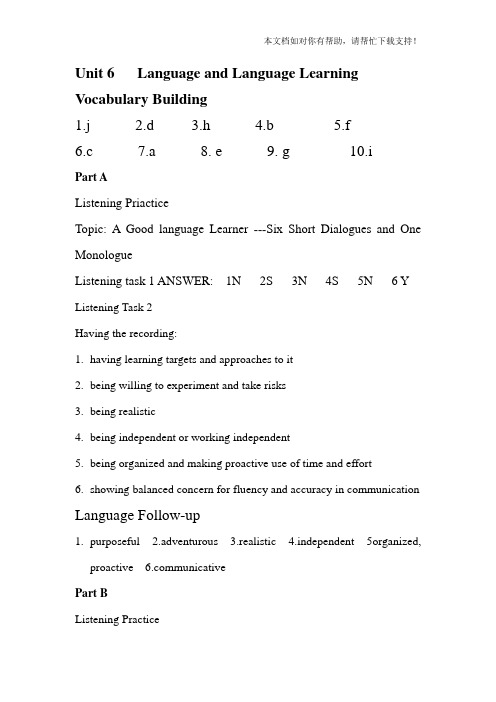
Unit 6 Language and Language Learning Vocabulary Building1.j2.d3.h4.b5.f6.c7.a8. e9. g 10.iPart AListening PriacticeTopic: A Good language Learner ---Six Short Dialogues and One MonologueListening task 1 ANSWER: 1N 2S 3N 4S 5N 6 Y Listening Task 2Having the recording:1.having learning targets and approaches to it2.being willing to experiment and take risks3.being realistic4.being independent or working independent5.being organized and making proactive use of time and effort6.showing balanced concern for fluency and accuracy in communication Language Follow-up1.purposeful2.adventurous3.realistic4.independent 5organized,proactive municativePart BListening PracticeTopic: Learning English in America ---an InterviewListening Task 1Questions asked by the interviewer:1.why did you choose “Stella” as your nickname?2.why did you choose to study journalism in America?3.did you say you had studied English for 10 years?4.Did you find it more difficult to speak English or to write it?5.Has there ever been an occasion when someone ridiculed yourEnglish?Listening Task 21. C 2 D 3 B 4 D 5 CLanguage Follow-up1.I’ve studied English for about 10 years, so there will be no greatlanguage barrier to communication if I choose to study in America. 2.I have a lot of friends and relatives here, so I can be taken care of bythem.3.English is an international language, so most of learn it when we areyoung.4.it seems in Taiwan we have more of an opportunity for reading andlistening5.I have learnt English for 10 years and still can’t express myself veryclearly.Part CListening practiceThe Story of the Norfolk-Pitcairn Dialect----a Radio TalkListening task 1This program tells us the origin of Norfolk-Pitcairn language, its development over the years, the problems it faces at present, and measures taken to save the language.Listening task 21 F2 T3 F4 F5 T6 FLanguage follow-up1.to2.of3.under4.on5.to6. with7.in8.ofPART AA Good Language Learner ---Six Short Dialogues and One MonologueLISTENING TASK 11.Man: Do you like going swimming with Mark in the river? Woman: He always swims in the river It's too dirty for me.Question: Does the woman like going swimming with Mark?2. Woman: Do you like listening to pop music?Man: It depends.Question: Does the man like listening to pop music?3. Man: Would you like to watch the football match with me tomorrowafternoon?Woman: Football matches are always awful.Question: Does the woman like watching football?4. Woman: Do you like Chinese food?Man: Not at all .Question: Does the man like eating Chinese food?5. Woman: Would you like an ice cream?Man: Well... I'd rather have something hot instead.Question: Does the man like eating ice cream?6. Man: Let's play computer games, shall we?Woman: Terrific!Question: Does the woman like playing computer games? LISTENING TASK 2There has been a lot of research in recent years into what makes a good language learner. Here is a brief summary of the latest theories: Good language learners think about how they are learning. They try to find out what works for them and what doesn't. If; they don't understand the purpose of a particular exercise, they ask their teacher for a clear explanation.Good language learners are willing to experiment and take risks. For example, they will out different ways of learning vocabulary until they find the way that suits them best. They are also not afraid of makingmistakes because they know that these will help them.Good language learners are realistic. They know that it will take time and effort to become proficient in English, and that there will be periods when they don't seem to be making much progress.Good language learners are independent. They do not expect to learn English just by sitting in the classroom, and do not rely on the teachers to direct their learning.Good language learners are organized and proactive. They use their time to learn English sensibly, and are always looking for opportunities to develop their language both inside and outside the classroom.Some students are extroverts in communicating their thoughts and do not care about making many mistakes in doing so. Good language learners, on the other hand, are concerned with both fluency in communication and accuracy of language usagePART BLearning English in America ...... an InterviewInterviewer:Hello, Miss Hsiao! From your CV we know that your Chinese name is Wenchin Hsiao, and that you have an interesting English nickname, "Stella". Why did you pick "Stella" as your nickname?Wenchin Itsiao: I wanted to find a unique name, and "Stella" sounds different. I picked it from a dictionary. "Stella" means star.Interviewer: Why did you choose to study journalism in the US? Wenchin Itsiao: I have at least two reasons. One is, the States is an English speaking country. I've studied English for about 10 years, so there will be no great language barrier to communication if I choose to study in America. The second reason is, journalism in the States is more advanced and influential than in any other countries. And there're quite a few world famous universities which offer best courses in journalism. Also, I have a lot of friends and relatives here, so I can be taken care of by them. Wenchin Itsiao: Yes, I started in junior high school . I also learned Japanese when I was at university. Japan occupied Taiwan of China for15 years, so a lot of people in Taiwan could speak Japanese. And also, fora Chinese, learning Japanese is easier because Japanese has borrowed a lot of words and characters from Chinese. Learning Japanese is easier than learning English. But English is international language, so most of us learn it when we are young.Interviewer: Do you find it more difficult to speak English or to write it? Wenchin Hsiao: Oh, I have difficulty in writing and speaking, but not in reading and listening. It seems in Taiwan we have more of an opportunity for reading and listening. But I have to improve my English writing and speaking skills in America.Interviewer Has there ever been an occasion when someone ridiculed your English?Wenchin Hsiao: No, but I'm a sensitive person. If I say something and they can't understand me, they'll say, "I'm sorry I can't understand you." If they say that, then I feel frustrated or embarrassed. I have been learning English for 10 years and still can't express myself very clearly.PART CThe Story of Norfolk-Pitcairn Language---- a Radio TalkBruce Hill: Hello and welcome to Pacific Focus on Today's Society. I'm Bruce Hill. Norfolk Island in the Tasman Sea is home to one of the most unique cultures in the Pacific. And one of the things the islanders are most proud of is their unique language. But as with many languages in the region, the Norfolk-Pitcairn dialect is under threat of being diluted or being superseded entirely by mainstream English. So for the first time it's going to be taught in the schools on Norfolk Island. Ellis Buffet has written a grammar book and dictionary of the Norfolk-Pitcairn language to help school children learn the language. She says one of the concerns that the islanders have is that inter-marriage with outsiders might dilute the languageEllis Buffet:A lot of children and young people who are of Norfolk Island blood or Pitcairn descent, who can't speak the Norfolk Island language, have come to me in recent years and asked me where their culture is and where their language is. By 1987, I foresaw that it would happen that the people would be wanting to know how to speak theirlanguage. So I have given the language a writing system because English is too hard. You can't use the English might speak a fair bit of English mingled with the language (which is not pronounced the same as English), it was necessary to have a spelling system that could write the language as we pronounce it.Bruce Hill: Is what you're doing here ... teaching it in schools and having written these books … are these going to be enough to save the language?Ellis Buffet: No, they're going to have to use it themselves; you know, practise. People used to go up to the school and tell children Norfolk Island words and do a little bit of conversational Norfolk Island language. But my vision is that people, whose mother tongue is the Norfolk Island language, will also write in it too, and express themselves using their own language as fully as they can in the language that they have learned as their native dialect.Bruce Hill: The Norfolk-Pitcairn language isn't of interest just to the islanders though. Professor Peter Muhlhausler of the Linguistics Department of Adelaide University says it's a fascinating blend of 18th century English and Tahitian , along with other elements. So Ms. Buffet, thank you for coming. And good luck to you!。
英语专业视听说book 1 Unit 6
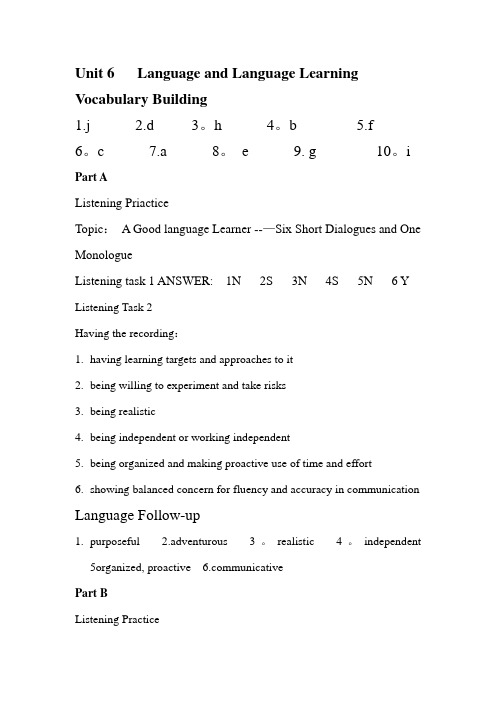
Unit 6 Language and Language Learning Vocabulary Building1.j2.d 3。
h 4。
b 5.f6。
c 7.a 8。
e 9. g 10。
i Part AListening PriacticeTopic:A Good language Learner --—Six Short Dialogues and One MonologueListening task 1 ANSWER: 1N 2S 3N 4S 5N 6 Y Listening Task 2Having the recording:1.having learning targets and approaches to it2.being willing to experiment and take risks3.being realistic4.being independent or working independent5.being organized and making proactive use of time and effort6.showing balanced concern for fluency and accuracy in communication Language Follow-up1.purposeful2.adventurous 3。
realistic 4。
independent5organized, proactive municativePart BListening PracticeTopic: Learning English in America —--an InterviewListening Task 1Questions asked by the interviewer:1.why did you choose “Stella” as your nickname?2.why did you choose to study journalism in America?3.did you say you had studied English for 10 years?4.Did you find it more difficult to speak English or to write it?5.Has there ever been an occasion when someone ridiculed yourEnglish?Listening Task 21. C 2 D 3 B 4 D 5 CLanguage Follow-up1.I’ve studied English for about 10 years, so there will be no greatlanguage barrier to communication if I choose to study in America. 2.I have a lot of friends and relatives here, so I can be taken care of bythem。
世纪商务英语听说教程专业篇I(第五版) (6)

300.
Active Listening
Task One
Section B
Listen to the second part of the conversation. Answer the following questions according to what you hear.
3. What will theon efficiency?
3. What is the function of the overalls?
To protect their clothes.
4. Why do they need to wear masks?
Because some of the raw materials are corrosive and irritant.
They will introduce advanced technology and equipments next year.
He will show Mr. Lee around and explain the operations as they go along.
Active Listening
Your Monthly Output
Active Listening
Task One
Section B
Listen to the second part of the conversation. Answer the following questions according to what you hear.
Task One
Brainstorm with a partner about what should be introduced when a customer is visiting your factory. Then match the English words or terms with their Chinese versions.
英语专业视听说book 1 Unit 6
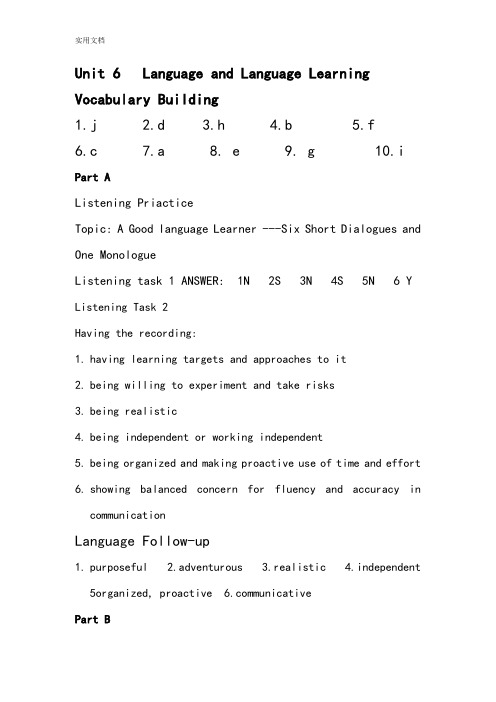
Unit 6 Language and Language Learning Vocabulary Building1.j2.d3.h4.b5.f6.c7.a8. e9. g 10.i Part AListening PriacticeTopic: A Good language Learner ---Six Short Dialogues and One MonologueListening task 1 ANSWER: 1N 2S 3N 4S 5N 6 Y Listening Task 2Having the recording:1.having learning targets and approaches to it2.being willing to experiment and take risks3.being realistic4.being independent or working independent5.being organized and making proactive use of time and effort6.showing balanced concern for fluency and accuracy incommunicationLanguage Follow-up1.purposeful2.adventurous3.realistic4.independent5organized, proactive municativePart BListening PracticeTopic: Learning English in America ---an InterviewListening Task 1Questions asked by the interviewer:1.why did you choose “Stella” as your nickname?2.why did you choose to study journalism in America?3.did you say you had studied English for 10 years?4.Did you find it more difficult to speak English or to writeit?5.Has there ever been an occasion when someone ridiculed yourEnglish?Listening Task 21. C 2 D 3 B 4 D 5 CLanguage Follow-up1.I’ve studied English for about 10 years, so there will beno great language barrier to communication if I choose to study in America.2.I have a lot of friends and relatives here, so I can be takencare of by them.3.English is an international language, so most of learn itwhen we are young.4.it seems in Taiwan we have more of an opportunity for readingand listening5.I have learnt English for 10 years and still can’t expressmyself very clearly.Part CListening practiceThe Story of the Norfolk-Pitcairn Dialect----a Radio Talk Listening task 1This program tells us the origin of Norfolk-Pitcairn language, its development over the years, the problems it faces at present, and measures taken to save the language.Listening task 21 F2 T3 F4 F5 T6 FLanguage follow-up1.to2.of3.under4.on5.to6. with7.in8.ofPART AA Good Language Learner ---Six Short Dialogues and One MonologueLISTENING TASK 11.Man: Do you like going swimming with Mark in the river? Woman: He always swims in the river It's too dirty for me.Question: Does the woman like going swimming with Mark?2. Woman: Do you like listening to pop music?Man: It depends.Question: Does the man like listening to pop music?3. Man: Would you like to watch the football match with me tomorrow afternoon?Woman: Football matches are always awful.Question: Does the woman like watching football?4. Woman: Do you like Chinese food?Man: Not at all .Question: Does the man like eating Chinese food?5. Woman: Would you like an ice cream?Man: Well... I'd rather have something hot instead.Question: Does the man like eating ice cream?6. Man: Let's play computer games, shall we?Woman: Terrific!Question: Does the woman like playing computer games? LISTENING TASK 2There has been a lot of research in recent years into what makes a good language learner. Here is a brief summary of the latest theories:Good language learners think about how they are learning. Theytry to find out what works for them and what doesn't. If; they don't understand the purpose of a particular exercise, they ask their teacher for a clear explanation.Good language learners are willing to experiment and take risks. For example, they will out different ways of learning vocabulary until they find the way that suits them best. They are also not afraid of making mistakes because they know that these will help them.Good language learners are realistic. They know that it will take time and effort to become proficient in English, and that there will be periods when they don't seem to be making much progress.Good language learners are independent. They do not expect to learn English just by sitting in the classroom, and do not rely on the teachers to direct their learning.Good language learners are organized and proactive. They use their time to learn English sensibly, and are always looking for opportunities to develop their language both inside and outside the classroom.Some students are extroverts in communicating their thoughts and do not care about making many mistakes in doing so. Good language learners, on the other hand, are concerned with bothfluency in communication and accuracy of language usage PART BLearning English in America ...... an Interview Interviewer:Hello, Miss Hsiao! From your CV we know that your Chinese name is Wenchin Hsiao, and that you have an interesting English nickname, "Stella". Why did you pick "Stella" as your nickname?Wenchin Itsiao: I wanted to find a unique name, and "Stella" sounds different. I picked it from a dictionary. "Stella" means star.Interviewer: Why did you choose to study journalism in the US? Wenchin Itsiao: I have at least two reasons. One is, the States is an English speaking country. I've studied English for about 10 years, so there will be no great language barrier to communication if I choose to study in America. The second reason is, journalism in the States is more advanced and influential than in any other countries. And there're quite a few world famous universities which offer best courses in journalism. Also, I have a lot of friends and relatives here, so I can be taken care of by them.Wenchin Itsiao: Yes, I started in junior high school . I also learned Japanese when I was at university. Japan occupiedTaiwan of China for 15 years, so a lot of people in Taiwan could speak Japanese. And also, for a Chinese, learning Japanese is easier because Japanese has borrowed a lot of words and characters from Chinese. Learning Japanese is easier than learning English. But English is international language, so most of us learn it when we are young.Interviewer:Do you find it more difficult to speak English or to write it?Wenchin Hsiao: Oh, I have difficulty in writing and speaking, but not in reading and listening. It seems in Taiwan we have more of an opportunity for reading and listening. But I have to improve my English writing and speaking skills in America. Interviewer Has there ever been an occasion when someone ridiculed your English?Wenchin Hsiao: No, but I'm a sensitive person. If I say something and they can't understand me, they'll say, "I'm sorry I can't understand you." If they say that, then I feel frustrated or embarrassed. I have been learning English for 10 years and still can't express myself very clearly.PART CThe Story of Norfolk-Pitcairn Language---- a Radio Talk Bruce Hill: Hello and welcome to Pacific Focus on Today'sSociety. I'm Bruce Hill. Norfolk Island in the Tasman Sea is home to one of the most unique cultures in the Pacific. And one of the things the islanders are most proud of is their unique language. But as with many languages in the region, the Norfolk-Pitcairn dialect is under threat of being diluted or being superseded entirely by mainstream English. So for the first time it's going to be taught in the schools on Norfolk Island. Ellis Buffet has written a grammar book and dictionary of the Norfolk-Pitcairn language to help school children learn the language. She says one of the concerns that the islanders have is that inter-marriage with outsiders might dilute the languageEllis Buffet: A lot of children and young people who are of Norfolk Island blood or Pitcairn descent, who can't speak the Norfolk Island language, have come to me in recent years and asked me where their culture is and where their language is. By 1987, I foresaw that it would happen that the people would be wanting to know how to speak their language. So I have given the language a writing system because English is too hard. You can't use the English might speak a fair bit of English mingled with the language (which is not pronounced the same as English), it was necessary to have a spelling system that could write thelanguage as we pronounce it.Bruce Hill: Is what you're doing here ... teaching it in schools and having written these books … are these going to be enough to save the language?Ellis Buffet: No, they're going to have to use it themselves; you know, practise. People used to go up to the school and tell children Norfolk Island words and do a little bit of conversational Norfolk Island language. But my vision is that people, whose mother tongue is the Norfolk Island language, will also write in it too, and express themselves using their own language as fully as they can in the language that they have learned as their native dialect.Bruce Hill: The Norfolk-Pitcairn language isn't of interest just to the islanders though. Professor Peter Muhlhausler of the Linguistics Department of Adelaide University says it's a fascinating blend of 18th century English and Tahitian , along with other elements. So Ms. Buffet, thank you for coming. And good luck to you!。
世纪商务英语Unit-6

Unit 6 网上商务Background knowledgeElectronic businessDefinitionElectronic Business, or "e-Business", may be defined broadly as any business process that relies on an automated information system. Today, this is mostly done with Web-based technologies. The term "e-Business" was coined by Lou Gerstner, CEO of IBM.Electronic business methods enable companies to link their internal and external data processing systems more efficiently and flexibly, to work more closely with suppliers and partners, and to better satisfy the needs and expectations of their customers.In practice, e-business is more than just e-commerce. While e-business refers to more strategic focus with an emphasis on the functions that occur using electronic capabilities, e-commerce is a subset of an overall e-business strategy. E-commerce seeks to add revenue streams using the World Wide Web or the Internet to build and enhance relationships with clients and partners and to improve efficiency using the Empty Vessel strategy. Often, e-commerce involves the application of knowledge management systems.E-business involves business processes spanning the entire value chain: electronic purchasing and supply chain management, processing orders electronically, handling customer service, and cooperating with business partners. Special technical standards for e-business facilitate the exchange of data between companies. E-business software solutions allow the integration of intra and inter firm business processes. E-business can be conducted using the Web, the Internet, intranets, extranets, or some combination of these.SubsetsApplications can be divided into three categories:1. Internal business systems:⊙customer relationship management⊙enterprise resource planning⊙document management systems⊙human resources management2. Enterprise communication and collaboration:⊙V oIP⊙content management system⊙e-mail⊙voice mail⊙Web conferencing3. Electronic commerce:business-to-business electronic commerce (B2B) or business-to-consumer electronic commerce (B2C) ⊙internet shop⊙supply chain management⊙online marketingModelsWhen organizations go online, they have to decide which e-business models best suittheir goals. A business model is defended as the organization of product, service and information flows, and the source of revenues and benefits for suppliers and customers. The concept of e-business model is the same but used in the online presence. The following is a list of the currently most adopted e-business models:⊙E-shops⊙E-procurement⊙E-malls⊙E-auctions⊙Virtual Communities⊙Collaboration Platforms⊙Third-party Marketplaces⊙Value-chain Integrators⊙Value-chain Service Providers⊙Information BrokerageClassification by provider and consumerRoughly dividing the world into providers/producers and consumers/clients one can classify e-businesses into the following categories:⊙business-to-business (B2B)⊙business-to-consumer (B2C)⊙business-to-employee (B2E)⊙business-to-government (B2G)⊙government-to-business (G2B)⊙government-to-government (G2G)⊙government-to-citizen (G2C)⊙consumer-to-consumer (C2C)⊙consumer-to-business (C2B)Reading Skill Focus1. I found, to my surprise, that the real key to writing a good paper is to have a passion for the things about which you are writing.2. From these statistics and from personal experience it is evident that no one is unaffected by cancer.3.There are many stereotypes about the character of people in various parts of the United States.4. DComprehensive Reading大家e起来上网购物1 即使是最狂热的购物者也有出师不利的日子:你找不到想买的东西,每个在你后面的人都好似故意要撞你,而你的双腿从臀部痛到脚趾。
- 1、下载文档前请自行甄别文档内容的完整性,平台不提供额外的编辑、内容补充、找答案等附加服务。
- 2、"仅部分预览"的文档,不可在线预览部分如存在完整性等问题,可反馈申请退款(可完整预览的文档不适用该条件!)。
- 3、如文档侵犯您的权益,请联系客服反馈,我们会尽快为您处理(人工客服工作时间:9:00-18:30)。
Active Listening
Section A
Task Two
Listen to the conversation again. Answer the following questions according to what you hear
1. What is the purpose of Mr. Lee’s trip?
1. Does the plant work with everything from the raw materials to the _fi_n_is_h_e_d_ product? 2. Shall we start with the _a_ss_e_m_b_l_y line? 3. That’s good. Is the production line fully _a_u_to_m__a_te_d_? 4. So what’s your monthly _o_u_tp_u_t_? 5. We store our raw materials, parts and a_c_c_e_ss_o_r_ie_s_ here.
H. 发货
J 9. capacity
I. 零件
F 10. facility
J. 生产量,生产力
Active Listening
The Strict Management
Active Listening
Section A
Task One
Peter Lee, a Chinese customer, is visiting an American factory. Listen to the first part of the conversation. List the facilities he wears during the visit.
Four. They are Main Production Area, Parts Storage, Warehouse, and Dispatch Section.
Active Listening
Section B
Task Two Listen to the conversation again and fill in the blanks with correct words.
ones will be disposed of.
Section B
Task One
Listen to the second part of the conversation. Answer the following questions according to what you hear.
5. How many sections does Mr. Miller mention in the conversation?
Part Ⅲ
Fun Break
Part Ⅳ
Listening and Speaking
Part Ⅴ
Situation Performance
Warming Up
Task One
Brainstorm with a partner about what should be introduced when a customer is visiting your factory. Then match the English words or terms with their Chinese versions.
3. What is the function of the overalls?
To protect their clothes.
4. Why do they need to wear masks?
Because some of the raw materials are corrosive and irritant.
D 1. warehouse
A. 独特的卖点
A 2. USP(unique selling point)
B. 工厂
H 3. dispatch
C. 原材料
B 4. plant
D. 仓库
I 5. part
E. 产品目录
C 6. raw material
F. 设备
A 7. catalogue
G. 部门
G 8. section
Active Listening
Welcome to Our Factory
Active Listening
Section C
Task One
Listen to the presentation about the introduction to a garment factory. Answer the questions below according to the presentation.
Active Listening
Section C
Task One
Listen to the presentation about the introduction to a garment factory. Answer the questions below according to the presentation.
பைடு நூலகம்
300.
Active Listening
Section B
Task One
Listen to the second part of the conversation. Answer the following questions according to what you hear.
3. What will they do to improve their production efficiency?
They will introduce advanced technology and equipments next year.
4. Where is the Dispatch Section?
It’s on the right hand of the warehouse.
Active Listening
1. How large is the plant and when was it set up?
It covers a total area of 45,000 square meters and was set up in 1963.
2. How many employees does the plant have?
( T ) 1. All volumes will be inspected as soon as they come into the warehouse. ( F ) 2. After cutting the piece, the goods will be sent to the next step directly. ( F ) 3. All the materials can be fused under the same circumstance. ( T ) 4. A garment will be pressed in order. ( F ) 5. The qualified goods will be transferred to the packing area while the unqualified
To visit the factory around.
2. What should he do before he enters the factory?
Sign the visitor’s book.
Active Listening
Section A
Task Two
Listen to the conversation again. Answer the following questions according to what you hear
3. What must the workers wear when they are cutting samples?
They must wear gauntlets to protect themselves.
4. What is their inspection standard?
No thread is allowed, no defect can be tolerated, and no bad sewing can be passed.
专业篇 I(第五版)
大连理工大学出版社
总主编 刘杰英 主 编 姜荷梅 陈振云 彭春萍 审 校 Chuck Thode
Unit 6 Welcome to Our Factory
Learning Objectives
1. To introduce the layout of a factory to customers 2. To instruct customers to do preparatory work before entering the
Active Listening
Section A
Task Two
Listen to the conversation again. Answer the following questions according to what you hear
5. When Mr. Lee is visiting the factory, what will Mr. Miller do?
He will show Mr. Lee around and explain the operations as they go along.
Active Listening
Your Monthly Output
